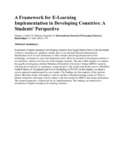| dc.contributor.author | Ondago, C. O. | |
| dc.contributor.author | Ondimu, K. O. | |
| dc.contributor.author | Muketha, Geoffrey M. | |
| dc.date.accessioned | 2017-02-28T05:50:07Z | |
| dc.date.available | 2017-02-28T05:50:07Z | |
| dc.date.issued | 2012 | |
| dc.identifier.uri | http://hdl.handle.net/123456789/258 | |
| dc.identifier.uri | https://www.researchgate.net/publication/301803336_A_framework_for_e-learning_implementation_in_developing_countries_a_students%27_perspective | |
| dc.identifier.uri | https://www.thefreelibrary.com/A+framework+for+e-learning+implementation+in+developing+countries%3A+a...-a0312726029 | |
| dc.description.abstract | Institutions of higher learning in developing countries have lagged behind those in the developed world in e-learning (eL) adoption, mainly due to cost and poor Internet infrastructure. Introduction of eL in such institutions is often complex involving introduction of new technology, resistance by users and alignment issues. Most eL research in developed countries is on continuity, which is not the case in developing countries. The aim of this chapter is to address this gap by investigating whether Mombasa Polytechnic University College (MPUC) students, who had never had any eL experience, would accept it. The model used in this case is a Modified Unified Theory of Acceptance and Use of Technology (UTAUT). In this chapter, we adopt a survey approach supplemented by case studies. The findings are that majority of the students believe that their results will improve with eL and that a blended learning system or 'Click-nMortar institution with many courses online' is the best model for MPUC and similar institutions. The research proposes a framework for eL implementation. The findings are beneficial to institutions of higher learning in developing countries. | en_US |
| dc.language.iso | en | en_US |
| dc.subject | E-Learning | en_US |
| dc.title | A Framework for E-Learning Implementation in Developing Countries: A Students' Perspective | en_US |
| dc.type | Article | en_US |

